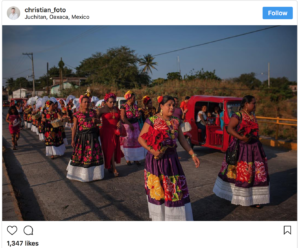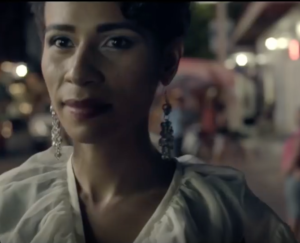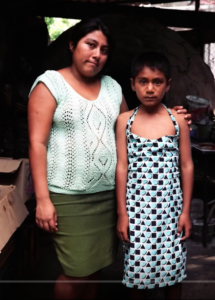
The idea that female and male identities are stagnant and gender is fixed at birth, while a commonly held belief in the US, is not unanimously accepted across cultures and the muxes are evidence of this. Muxes are a third gender within Southern Mexico that challenge a “traditional” idea of gender. They belong to an indigenous community called the Zapoteca that live in Juchitán, Oaxaca, México. There is limited information about how long muxes have been a part of Zapoteca Society, but the Zapoteca culture dates back to the 6th century, and it is generally believed that muxes have existed within Zapotect Society since ancient times . Two documentary short films, Third Gender: An Entrancing Look at Mexico’s Muxes by National Geographic and Muxes by The Guardian, share personal narratives from muxes living in Juchitán. Through first-hand accounts and interviews with muxes these films provide an idea of who the muxes are and what life is like for them for those of us who are not members of Zapoteca society.
Muxes identity encompasses both femininity and masculinity, but also stands alone as something separate. People who are muxes are almost always assigned male at birth, but express feminine characteristics from a very young age. “We assume female roles without wanting to be female” one muxe from Third Gender: An Entrancing Look at Mexico’s Muxes explains. “It’s not being gay, It’s not being homosexual, it’s not about being another role in society, it’s just being muxe. Being muxe is just being muxe.” (1:03). Carolina explains in Muxes.
While it’s unclear the exact amount of acceptance muxes have received throughout history, it seems that their presence has always been acknowledged in their society. Both films talk about muxes as a cultural tradition that has been alive for generations, but there has been a more recent act of reclaiming this gender identity for muxes that has led to further acceptance, rather than just acknowledgment. Individuals within both films make reference to how opinions towards muxes have grown increasingly more accepting within even the last decade. Still, there seems to be an innate cultural understanding of who Muxes are as people that is generations deep. Many muxes in both films speak of how their parents knew that their children where Muxes from a very young age without the muxes having to come out as a different gender on their own.

Photo by Christian Rodríguez
Evidence of acceptance for muxes in ancient Zapoteca culture comes from their language. A Muxes interviewed in the documentary Third Gender: An Entrancing Look at Mexico’s Muxes explains the change the Spanish language brought when the conquistadores colonized Mexico. They say that the Spanish valued men and women differently and therefor made distinctions for them within their language. The ancient Zapoteca people did not need to create separate distinction for gender because they valued men and women equally. This led to a different way of conceptualizing gender in the native language used by the Zapoteca people. Pronouns were not gendered but, instead, delineated by if the subject is a person, animal, or inanimate object.
Even though muxes existed and were generally accepted in ancient Zaptoeca society, and in recent times there has been a reclaiming of Zapoteca culture, Muxes still experience different levels of approval from individuals within their community today.
A Muxe from Third Gender: An Entrancing Look at Mexico’s Muxes, shares their stories of acceptance.
 “The people from the village they give you affection and cheer you when you look good, maybe sending you a kiss telling you that you look better now than before, that you are a swan, not a duck anymore. So obviously you believe them while you grow up, and you start becoming a very different person, and you don’t start to live above the clouds, on the contrary, you start living on earth. Relying on that same community that comfort you and cherishes you, and you start seeing the world in a different way. Not like pink…but definitely more colourful” (7:20)
“The people from the village they give you affection and cheer you when you look good, maybe sending you a kiss telling you that you look better now than before, that you are a swan, not a duck anymore. So obviously you believe them while you grow up, and you start becoming a very different person, and you don’t start to live above the clouds, on the contrary, you start living on earth. Relying on that same community that comfort you and cherishes you, and you start seeing the world in a different way. Not like pink…but definitely more colourful” (7:20)
While many muxes shared similar experiences within their community, this is not always the case and wider Mexican ideals surrounding gender are present in parts of Juchitán as well.
Mariano-Estella’s dad was a Fisherman and spent much of his time on a boat outside of the town of Juchitán. “he didn’t really get this” they explain “He didn’t get if I was a he or a she”.
 Carolina’s mom reflects on her experience having a child who is muxe and gives us a glimpse into how Zapoteca culture has merged with a wider Spanish influence over the years. “Honestly, I wanted him to be a man, but he was born like this. It is something from birth. As soon as he started walking we knew he was like that. It doesn’t bother me, he is my son I accept him the way he is.” She expresses a desire for a child that fits more cleanly into mainstream society views of gender because she knows that this will make life easier for her child but also acknowledges and accepts her Carolina for who they are.
Carolina’s mom reflects on her experience having a child who is muxe and gives us a glimpse into how Zapoteca culture has merged with a wider Spanish influence over the years. “Honestly, I wanted him to be a man, but he was born like this. It is something from birth. As soon as he started walking we knew he was like that. It doesn’t bother me, he is my son I accept him the way he is.” She expresses a desire for a child that fits more cleanly into mainstream society views of gender because she knows that this will make life easier for her child but also acknowledges and accepts her Carolina for who they are.
While generally life is easier for Muxes living in Juchitán than in other parts of Mexico, they are not completely immune to global trends affecting those with gender identities that exist outside cis-male and cis-female.
Tears swell in Vidal-Mariana eyes as they spoke of what being muxes has meant for them growing up. They reflect on the abuse they suffered from their father and how they turned to prostitution in a large city because there were very few opportunities for Muxes to get other work. This points the the diverse experience mixes can have, even within the same town, depending on individual relationship.
Reflecting on muxes in Zapotec culture is just a single example of how gender can be shaped in different cultures. Through this example we see how one ancient culture perceived gender in a way that allowed for the third gender of muxes and how muxes and Zapoteca culture has both been influenced by outside forces and hung on to ancient traditions in ways that alter the amount of acceptance and individual may have.
So interesting to learn about these gender binary-breaking cultures across the world that don’t get historical/mainstream attention! Thanks for the post!
Thank you for writing this! I’ve been thinking a lot about the legacies of colonialism and how Western values and conceptions of “gender” have been and continue to be imposed on cultures around the world. I study international development, and I think so many of the problems that arise come from a similar trend of imposing Western values and conceptions of “development” or “progress.” I think it’s really important to consider the possibilities of what could happen when we learning to recognize and embrace the traditions and legitimacy of other cultures (gender expressions, economic systems, etc.) outside our usual ideas of what they should look like.
I will always be so ironic to me that people from countries which are seen as “developing” are MORE socially progressive than so-called “developed” countries. I think it is so important and interesting that there is such a clear and long history here of muxes in Zapotec culture. In class we have debated why this “trans* history” is important, and whether we are looking for “proof” and whether this is a useful search. Although that may be true, I think there is a lot of value in this historical visibility. However, as you pointed out, identifying as a Muxe does not mean acceptance into society, and they experience many of the same struggles that trans* individuals suffer in the US. Thank you for sharing on this topic, it was a really interesting read and I loved the pictures!
I am definitely not as aware of non-western concepts of third-gender as I am with western traditions of trans* and trans* identity. The only other non-western third gender I had heard of before this post was the Hijra identity in India. So honestly thank you for this post because I had no idea about third gender communities in Mexico (though I’m sure this is only a small representation). I will absolutely be watching both of the documentaries mentioned in this blog post because I would love to know more about the Muxes interviewed in the Zapoteca culture. I also find it so interesting that for all the tourism that happens in southern Mexico, that there is not more knowledge of Mexican cultures that accept and value third genders. This was a great post to read and helped educate me a little more on non-western genders outside the binary we typically ascribe to.